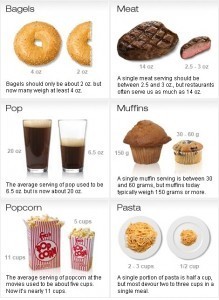"It’s all about portion control" or is it… Talking about DOR
 “I’m a registered dietitian, I have two small children (who eat totally different from each other, one picky, one adventurous), and I support and practice the DOR. I have been having some pretty heated (ok, it’s probably just me) conversations with some of my coworkers (not dietitians) about the feeding relationship. I feel like in trying to describe the DOR, I end up getting defensive and maybe a bit pedantic. Any advice would be greatly appreciated. ” -facebook question
“I’m a registered dietitian, I have two small children (who eat totally different from each other, one picky, one adventurous), and I support and practice the DOR. I have been having some pretty heated (ok, it’s probably just me) conversations with some of my coworkers (not dietitians) about the feeding relationship. I feel like in trying to describe the DOR, I end up getting defensive and maybe a bit pedantic. Any advice would be greatly appreciated. ” -facebook question
This made me think of the conversations I have when people find out that I am a childhood feeding specialist, helping parents with weight concerns, among other things. Almost always, the person I am chatting with launches into explanations for the “obesity epidemic,” you see, we all know, “it’s the portions!” (Or High Fructose Corn Syrup, or not enough recess, or lazy parents, or the food industry…) Picky eating? They inform me it’s just “parents who don’t know how to cook,” or who are “too permissive…”
It’s a unique experience to be well-read and versed on research and clinical experiences and then to have everyone think they know the answers. I imagine bridge builders don’t have the same experience… “Oh, you’re a bridge builder! You know, the problem with all these bridges falling apart is that you need a wider base to hold them up with, we all know that!”)
First off, for new readers, DOR is the Division of Responsibility, which basically says that if parents do their jobs with feeding: provide variety of tasty foods, structure, family meals, no pressure, then children can be trusted to decide how much to eat from what is provided.
It trusts that humans are capable of self-regulation. And this is where people get stuck.
Many Americans think, “Humans are not capable of self-regulation, and if we don’t teach kids portion control, who will?” (This is a literal quote from a feeding therapy trainer to a room full of OTs and STs, who are the ones “teaching” kids to eat in feeding therapy sessions, and not one person challenged that statement. I’ve also heard pediatricians and others say that humans can’t self-regulate.)
Here is what we all “know”: fat kids are fat because they eat too much, skinny kids need to eat more… The DOR does not accept this. It accepts that even children growing in a healthy way at the extremes can be trusted to self-regulate, and therefore is totally antithetical to how most people think about food, feeding etc. Which is, “it’s all about portion control”, and, kids can’t self-regulate so we have to do it for them. If you can’t trust that kids can self-regulate, then you can’t trust them to do their jobs, and you can’t do the DOR.
The first question came in just after I tried to explain to a Dad in the park that it’s not all about portions, at least not the way he thinks it is. But let’s say that some people eat lots more than they need to, well beyond satiety, and some do. Here’s how I approach talking to folks about the model I work in, and note, this is a work in progress!
1) I accept that I won’t convince anyone of anything in one brief chat.
2) I often share how I used to believe in “portion control” or calories in, calories out, but I saw that it didn’t work with my patients and it didn’t work for my family. “You know, I used to think so too, but after spending a few years reading, seeing it work in my own home, and transform the lives of my clients, I’m pretty convinced…”
3) I acknowledge that it took two good years of reading the research to convince myself that the Trust Model is the way to go. I also acknowledge that every experience, interaction and study I’ve read since then has strengthened this conviction.
4) I acknowledge that some folks eat beyond full, and I suggest that culturally we actually train children to do so. 85-90% of Americans feed their children with the control model, which most often for young children means asking them to eat more, take two more bites, and not believe them when they say they are full. So, in essence, we teach children, who are BORN with the ability to self-regulate, to overeat. We teach them through clean-plate rules, or veggies and protein before dessert rules, to eat for reasons other than the signals coming from inside their bodies.
So, the answer is not to impose arbitrary portion limits, diets or restricting. I tell folks that we’ve tried that, FOR DECADES, and it’s not working. The answer is to help people learn to get back in touch with cues of fullness and satiety. To feed themselves well, with foods that taste good, at regular intervals—not to diet.
I find a few phrases helpful:
“We’re working really hard to get kids to be good eaters, to get them to eat more or less, or different foods, and most of our efforts make things worse.”
“How is what you are doing now working for you?”
“It doesn’t have to be so hard.”
“Kids are born with a wisdom, knowing how much to eat. Is it about portions? Maybe, but only because the way we feed kids in America trains many children to overeat. We can either feed kids in a way that supports their internal skills, or we can feed them in a way that suppresses and buries those cues of hunger and fullness.”
I hope that helps get you thinking some more. Would love to hear what you have tried…
Thanks for writing in and fighting the good fight! Part of why I wrote my book, Love Me, Feed Me, is to explain all this to parents and professionals in an accessible way.



